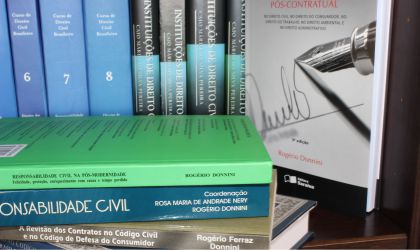Artigo - Rogério Donnini, Raphael Abs Musa de Lemos
Dignidade e autonomia: a ponte dogmática para o testamento vital / Dignity and autonomy: the dogmatic bridge for the living will
Resumo
Trabalho enviado em 27 de junho de 2016. Aceito em 31 de agosto de 2016.
DOI: 10.12957/rqi.2017.23531
Resumo
O presente artigo tem o objetivo de examinar o testamento vital como uma categoria negocial autônoma a partir dos princípios da dignidade da pessoa humana e da autonomia privada. Optou-se, para tanto, por metodologias dialética e dedutiva, confrontando-se, assim, o pensamento dos autores que se dedicaram ao tema e realizando-se inferências a partir das premissas gerais histórico-filosóficas traçadas nas primeiras seções do trabalho, com o complemento de algumas decisões judiciais. Desse modo, entende-se que o testamento vital tem natureza de negócio jurídico extrapatrimonial, unilateral e personalíssimo, com o objeto voltado ao disciplinamento de intervenções médicas em momento futuro, antecipando então o desejo ou a recusa do paciente de manter-se artificialmente vivo, ou de receber determinado tratamento. A forma deve ser livre, salvo futura disposição legal, e o agente deve gozar da capacidade de consentimento, implicando discernimento específico para o ato. Ao final, conclui-se pela necessidade de admitir-se a eutanásia em hipóteses estritamente definidas em lei, sem significar que a sua vigente proibição seja obstativa ao reconhecimento hodierno da morte digna no Brasil.
Palavras-chave: Dignidade da Pessoa Humana; Autonomia Privada; Direitos da Personalidade; Diretivas Antecipadas de Vontade; Morte Digna
Abstract
The present paper has the goal to examine the living will as an autonomous negotiating category from the principles of the dignity of the human person and the private autonomy. It is opted, for this purpose, for dialectical and deductive methodologies, thus confronting the thought of authors that have engaged upon the theme and performing inferences from the generic historical-philosophical premises outlined in the first sections of the work, with the complement of some judicial decisions. Therefore, it is understood that the living will has the nature of immaterial, unilateral and strictly personal legal transaction, with the object turned to the discipline of the medical interventions in a future moment, anticipating then the patient's desire or refusal to being kept artificially alive, or to receive certain treatment. The form has to be free, except for future legal disposition, and the agent has to enjoy the capacity of consent, implying specific discernment for the act. At the end, it is concluded that is necessary to admit the euthanasia in hypotheses strictly defined in the law, without meaning that the current prohibition is deterrent for the present recognition of the dignified death in Brazil.
Keywords: Dignity of the Human Person; Private Autonomy; Personality Rights; Living Will; Dignified Death.



